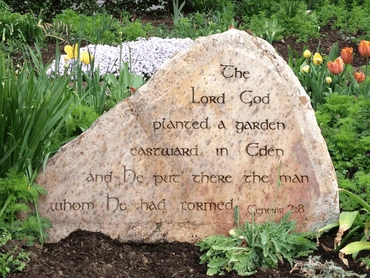Explanation of Genesis 2:17
Ni Brian David

There is, for everyone, a crossroads when it comes to spiritual things, a basic decision to be made. Are you going to believe in the Lord and in spiritual reality? Or are you only going to believe what you can see, touch, feel and otherwise "know" from your own mind? The Writings say those who choose the latter course are closing themselves off from the truth, because by definition spiritual reality cannot be seen, touched, felt or otherwise "known" through purely human means. That's what it means to eat "of the tree of the knowledge of good and evil," and it leads to spiritual death – which is being cut off from the goodness and truth the Lord wishes to bestow on us.
The people of the Most Ancient Church were in a state of love to the Lord, and had been invited to gather all the wisdom and knowledge flowing from that love – the fruit of all the other trees. But they had to accept the Lord as the source, had to accept that He existed, had to accept that He was infinite and beyond their finite understanding. To think otherwise – to think that through their own minds they could explain the Lord – would be to put themselves above him, and lead them into evil.
It's worth noting that this was not a call for people to shut down their minds. The fruit of the other trees represents an incredible bounty of exploration, learning and wonderment. And we're not called on to shut down our minds today; the Lord gave us our intellectual faculties for a reason. To let the Lord in, though, we have to accept the unprove-able idea that He is love itself and reality itself, and see all other knowledge in that light.
(Mga Sanggunian: Arcana Coelestia 126-132, 127, 128-134, 129, 0130)
Arcana Coelestia # 130
130. The person who wishes to become wise from the world has for his 'garden' sensory evidence and factual knowledge. His 'Eden' is self-love and love of the world, his 'east' is the west or himself. His 'river Euphrates' is all his factual knowledge, which is condemned; his 'second river', where Asshur is, is his insane reasoning from which come falsities; his 'third river', where Cush is, is the resulting assumptions he makes consisting of evil and falsity, which are his cognitions of faith; his 'fourth' is the wisdom that results, which in the Word is called magic. This is why Egypt, which means knowledge, after it has become magical, means this kind of person, the reason being that he wants to become wise from self, as shown throughout the Word. Such people are described in Ezekiel as follows,
Thus said the Lord Jehovah, Behold, I am against you, Pharaoh king of Egypt, the great monster lying in the midst of his rivers, who said, My river is my own, and I have made myself. And the land of Egypt will be made into a desolation and a waste. And they will know that I am Jehovah. Moreover he has said, The river is mine, and I made it. Ezekiel 29:3, 9.
People like this are also called in the same prophet where again Pharaoh or the Egyptian is the subject 'the trees of Eden in hell' as follows,
I will cause him to go down into hell with those going down into the pit. Whom have you become like in glory and in greatness among the trees of Eden? You will be made to go down with the trees of Eden into the nether world, in the midst of the uncircumcised, with those pierced by the sword. This is Pharaoh and all his horde. Ezekiel 31:16, 18.
Here 'trees of Eden' stands for facts and cognitions drawn from the Word which they profane in this manner by means of reasonings.






